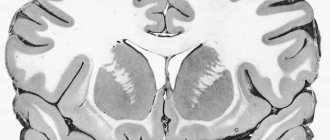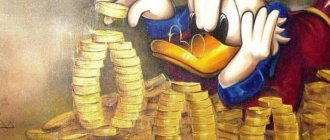- KtoNaNovenkogo
- FAQ
- Are you here
July 19, 2020
- What it is
- The theme of greed in foreign literature
- In Russian literature
- Greed and other vices
Hello, dear readers of the KtoNaNovenkogo.ru blog.
Among the vices of mankind, greed is one of the most unpleasant.
Even this word sounds alarming and predatory.
Difference between greed and stinginess
The meaning of the word “greed” can be defined as an abnormally strong desire to obtain as much financial wealth as possible. Stinginess is the desire to spend as little money as possible to achieve some goal or make a purchase. The nature of a stingy person is significantly different from the nature of a greedy person.
The confusion between the two concepts occurs because the ultimate goal of people suffering from these vices is the same. We are talking about increasing your financial wealth.
If we talk about these concepts not as vices, but as personality traits, then psychologists tend to agree that sooner or later they unite in an individual, forming a powerful negative symbiosis. The result will be a categorical reluctance to part with accumulated wealth. The need to increase it can become an overvalued idea, leading to the destruction of a person’s moral character, since he will use any, even immoral, opportunity to satisfy his financial thirst.
In the process of communicating with a person, it is important to learn to understand when we are talking about frugality, sound prudence and economy, and when about greed and stinginess - exaggerated forms of these useful qualities.
Examples of greed in foreign literature
As examples, we can recall the characters of two classic works of world literature: Plautus’s play “ Kubyshka ” and Moliere’s play “ The Miser ,” written based on its plot.
The old miser Harpagon does not want to share his wealth with his son and daughter and hides a box of jewelry in the garden. He decides to arrange a profitable marriage for his daughter; he also sees his son’s destiny in making money. With the help of clever servants, the children arrange their own future; the father has no choice but to agree to their not-so-profitable weddings in exchange for the right to get his treasures back.
Moliere laughs at the miser, who is so painfully experiencing separation from gold.
The theme of stinginess sounds differently in Balzac’s story “ Gobsek ”.
The Parisian moneylender Gobsek is not just stingy, he is greedy. For the sake of earning money, the old man gets involved in family squabbles, and great human tragedies happen before his eyes: treason, betrayal, death. But Gobsek is cold and calculating, like a spider. He weaves threads of intrigue to capture the unfortunate victim and get as much as possible from her.
For Balzac, the image of a moneylender is associated with the gloomy and sinister soul of his contemporary civilization, a symbol of an age ruled by money.
Greed as a character trait
Greed is not just some temporary state in which a person may be under the influence of any negative factors. It is not a feeling, although it is described that way in many cultures. This is a chronic condition that can change consciousness, even if its course is not accompanied by any acute attacks.
The state of mind in which an individual suffering from greed is located to some extent affects the functioning of the autonomic nervous system, which directly affects the “behavior” of the heart, respiratory and excretory systems. This has a negative impact on health: often exposed to such moods, a person faces such a problem as arterial hypertension.
Alkaline water is harmful to the body
Alkaline water, like any other composition, may include certain contraindications. We have already figured out what it is. Now let's look at the harm.
1. If you are diagnosed with diabetes, consult your doctor. The benefits and harms of the drink depend on the individual health status. In some cases, alkaline water may be contraindicated for this condition.
2. In case of kidney failure, urolithiasis, bilateral chronic pyelonephritis, the dosage must be observed, otherwise water can equally bring beneficial properties and harm.
3. If the pH balance is normal, you should refrain from drinking alkaline water or drink it once a month. The same goes for low acidity; you shouldn’t go too heavy on the composition. Otherwise, you will experience side effects. They are manifested by vomiting, nausea, dizziness, confusion, tremors of the arms and legs.
4. You should not drink exclusively alkaline water, removing regular, filtered water from your diet. Alkalinization of internal organs is as dangerous as a lack of salts. Everything should be in moderation, remember this.
Psychological origins of greed
Despite the fact that the history of money as a means of exchanging various goods, benefits and services began relatively recently, greed was familiar to primitive people. Humanity began to fall into this state en masse when it was faced with the problem of a shortage of food and other vital resources. If at this stage you try to draw some conclusion, you can involuntarily come to the conclusion that a person is prone to greed at the genetic level, so consciousness is not able to control it. If we take this into account, it becomes clear why greed can manifest itself at a very early age - from the moment a child develops self-awareness.
Adolescence is the only time when a person, being not yet fully formed, can control the feeling of greed.
This control is facilitated by purely youthful maximalism, seeing everything that happens around only in black and white. He makes the teenager understand that greed is a negative quality in a young team, where almost everyone does not stand out for their financial situation. The desire for respect from peers makes a teenager need to hide his greed, so as not to get out of the company. This effect cannot be maintained for all subsequent years of life.
Greed can be compared to the sexual instinct. Their striking similarity is that they can remain deep in the subconscious for a long time, not bother a person for many years, but then, acquiring new, sometimes very perverted forms, they can ruin his life.
The most innocent manifestation of greed is the desire for high earnings, even if this is objectively beyond one’s strength. The desire to receive more and more, under the auspices of ensuring a decent standard of living for yourself and your family, at some point can get out of control, turning into mania. Often, workaholism is also connected to this, which can literally drive a person to the grave.
Submitting to a feeling of uncontrollable greed, some people are capable of consciously committing crimes aimed at the safety of other people's property, and sometimes the life of another person. In order to supposedly improve their quality of life, especially greedy representatives of the human species enter into arranged marriages, break off relations with close relatives and friends, and refuse custody of parents who, due to circumstances, cannot fully care for themselves.
Short-term manifestations of greed
This is manifested in the reluctance with which most people who have not encountered this pathological psychological state in their lives give back money they once borrowed. One of the manifestations of greed may be refusing a loan to one of your friends or relatives, even if the necessary amount is available for this.
There are situations in which an individual cannot afford to make some expensive purchase, even if he needs it. This is a natural situation for almost every member of the middle class, and some kind of temporary savings can be a solution. If we are talking about regular refusals to purchase some pleasant and useful little things for yourself and your loved ones, the person has crossed the border of economy and frugality.
Strategies for behavior towards money
Every adult individual sooner or later determines for himself some strategy for earning and spending money. Basically, it is formed based on the attitude towards material wealth that was instilled in the child in childhood by his parents. It is not uncommon for a behavior strategy to be deliberately incorrect, because at an early age a person faced some financial problems that affected the quality of life of his family:
- Greed is an unhealthy desire to increase one’s income by any possible means.
- Stinginess is both a similar and different state from the previous one, in which a person avoids any financial expenses, even the most insignificant ones, in order to preserve his capital.
- Greed is a combination of the first two states that is formed in a person in the presence of one of them.
- “Big Game” is a very abstract term that can be interpreted in many different ways, but it can be used in the context of entrepreneurship. When we are talking about a person who has a healthy desire to increase his capital in order to be able to further allocate from it the funds necessary for investing in new projects that can generate profit.
- Prudence is a borderline state between frugality, thriftiness and stinginess, greed.
- Generosity is the ability to easily part with earned money. This is a quality that is directed largely not at oneself, but at other people surrounding a person in one or another area of his life.
- Wastefulness is the total inability to save what has been earned. Spendthrift people part with money so easily that almost all income from their work tends to disappear on the very first day after payday.
The economic essence of budget expenditures
The economic essence of expenses has recently attracted the interest of modern researchers, so the exact definition of this concept is still unknown in economics. It is known that this is an economic category, and its functions are partially described. But in the context of the rapid dynamics of economic development, its functions and classification characteristics are undoubtedly expanding.
One of the common definitions of expenses is “distribution of costs for government purposes.” Expenditure functions as an economic phenomenon include: redistribution, allocation and control. Let's consider the redistribution of expenses: this is the process of “working” of the budget fund. The state fund is formed at the expense of GDP and national income.
Attention!
It is important to know that budget expenditures include the entire economic sphere of the state, subject to all macroeconomic proportions of the national economy. The main priority is the social sphere. Healthcare, education, culture, and the state’s housing stock are also primarily supported. Redistribution is the secondary distribution of funds.
The allocation function is the process of determining specific areas of budget expenditures.
The concept of Allocation in the economic essence of expenses
Allocation is the distribution of resource assets along previously specified directions. The state offers citizens benefits that no private individual can offer.
This includes funding for security, safety, and road construction, which in turn do not contradict state interests. The orientation function is justice and rationality, as well as efficiency.
At the state level, expenses stop if funds are not used effectively and zero results are achieved. Savings must be present everywhere. As for control, costs are closely related to the previous two functions.
Expenses are a social means of control, an instrument for maintaining proportions in the economic system. Items are always determined by the essence of the expenses, and not by the type of activity for which the funds are directed. For example:
- raw material costs;
- materials;
- components,
- fuel;
- electricity;
- salary accruals;
- depreciation of fixed assets;
- payment for services;
- for equipment maintenance;
- for the preparation of new production facilities;
- for losses during marriage;
- non-production expenses.
See also: Where to get a loan for a disability pensioner
Budget expenditures can be divided depending on the impact on expanded production processes:
- Current budget.
- Capital budgetary.
Current budget expenditures are associated with the provision of budget funds for maintenance and covering current needs.
For example: the purchase of goods and services, the maintenance of sectors of the national economy, the payment of interest on public debt. Capital expenditures include cash costs aimed at increasing fixed capital and increasing reserve assets.
For example: investing in sectors of the national economy, government loans to enterprises, investment subsidies.
Economic Cost Factors
The budget consists of a set of expenses and monetary resources intended for financial support of the state and local government. As an integral component of the budget, without which it will simply be a “plan on paper,” expenses are defined as the costs of performing government functions. The principles for the formation of the expenditure fund are regulated by the state.
Budget expenditures are funds received from taxpayers. And in return, the state fulfills its obligations to taxpayers. In essence, expenses are identified in certain categories depending on the area of receipt. The type of expense essence directly depends on its purpose and size.
The factors that directly allocate costs are the following:
- the nature of the state;
- functions of the state;
- level of economic and social development of the country;
- features of the country's territorial administration;
- administrative distribution of territorial units of the country;
- budget features;
- ethnic composition of the population and related characteristics.
In all government expenditures, the flow of allocated funds is controlled by special services so that they are used strictly for their intended purpose and in the directions provided for by the budget.
Financial problems increase the likelihood of unexpected expenses.
Source: https://businessideas.com.ua/manage-finances/sushchnost-raskhodov
conclusions
The ability to spend money wisely is an art that is not given to everyone. If a person was not endowed with it due to some life circumstances, he should learn to recognize the borderline states of frugality, so as not to get bogged down in greed and stinginess.
Greed gives rise to evil in people, which is why greed is called one of the most unpleasant manifestations in Christianity: anger, greed and crime are born from greed. Only an insatiable greed for knowledge and doing good deeds is justified, and everything else is discussed below in the article.
Why are people greedy?
Greed is most often understood as specific personal data:
- the desire to have and spend more money on yourself;
- lack of desire to lose your wealth;
- the desire for accumulation and acquisitiveness.
Sometimes, a completely non-greedy person may exhibit actions that are associated with greed, for example, an unwillingness to spend money on himself or his loved ones - this may be caused by a financial situation or a number of circumstances.
Greed has existed at all times - it is a natural quality of character, since material wealth has always determined the level of existence and life. Greed is a trait in a person’s character that can be brought up by parents or appear under the influence of various external factors, such as poverty, etc.
Terminology
Words such as greed or hungry are now used only in literary genres. More often they will say about a person “greedy” or “stingy.”
Yes, these terms are radically different. Greed is a person’s desire to get more, and stinginess is the desire to spend the least amount. The greedy seeks to increase receiving, and the stingy seeks to moderate waste.
Greedy or thrifty?
Concepts such as “thrift” or “thrift” are close to greed and avarice, but they differ from each other. Thriftiness is an attempt to benefit from small savings, while greed is not a subconscious decision to stop spending in an attempt to accumulate as much as possible. Greed has always ended in failure; just remember the Greek myth about King Midas, who turned everything into gold with his touch. We advise you to read
Greed
– an irrepressible, immoderate tendency of a person to obtain material wealth, the desire to get as much as possible; greed, stinginess, tendency to hoard. website
The reason for greed lies in the substitution of the concepts of life values. A greedy person, provoked by the mass culture of overconsumption, equates money with happiness. Greed is a product of the human ego. Driven by the desire to satisfy the thirst for affirmation of his importance, the money lover tries to drown out his dissatisfaction and feeling of inner emptiness by accumulating material wealth.
Greed has much in common with self-interest, greed and stinginess. Ignoring the spiritual part of life, greed gives rise to envy, isolation, anger, fear of loss of wealth, practically driving a person crazy. The root of greed often lies in childhood: if parents replace their love and attention with expensive gifts, in adulthood the child will also measure spiritual values in monetary terms.
To get rid of manifestations of greed in character, a person needs to change erroneous guidelines to correct ones, realizing that love, recognition, respect can be obtained for free if you learn to share them with others.
- Greed is an unquenchable thirst for material wealth.
- Greed is the “idolatry” of money, considering it the main value in life.
- Greed is the replacement of spiritual goods with material ones.
- Greed is greed taken to the extreme squared multiplied by insanity.
- Greed is one of the seven deadly sins.
Disadvantages of Greed
- Greed knows no boundaries between one's own and another's.
- Greed makes a person commit crimes.
- Greed makes a person envious and unprincipled.
- Greed gives rise to a constant fear of losing goods - greater than the joy of possessing them.
- Greed leads to degradation and destruction of the individual, who is incapable of generosity and compassion.
Manifestations of greed in everyday life
- Religion.
Greed (love of money) is the second of the seven mortal sins in Christianity. Priests believe that regular abuse of minor sins, which were called “mortal”, leads to the death of the immortal soul. Thus, a person who has committed murder can deeply repent and find eternal peace after death, while someone who has constantly committed a “small” sin and has not repented can destroy his soul and go to Hell. - Plyushkinism.
The root of greed lies in a psychological disorder called syllogomania or “Plyushkinism” - the tendency to collect and store unnecessary things. The disease may be a consequence of a lack of material attention in childhood or a feeling of pathological uselessness to other people, which the “Plyushkin” seeks to compensate for by possessing things. - Shopaholism.
The irrepressible pleasure of shopping, akin to a drug, is a harmful manifestation of greed and leads to psychological dependence. Quickly turning into a disease, the thirst for new experiences through shopping leads to an increase in consumer loans, poverty, disintegration and degradation of personality. - Film "Greed".
The film, dedicated to the theme of greed, has become a classic of world cinema. Included in the National Essential Film Registry. The film tells the story of how the love of money destroyed the friendship of old friends and the love of spouses, and ultimately led to poverty and the death of the main characters.
How to overcome greed
- Overcome self-doubt.
Greed is often an inferiority complex packaged in an expensive package. By accumulating wealth, a person tries to increase his importance in the eyes of others, without being able to do this in other ways. However, the possession of material goods can never satisfy his inner thirst for recognition. Only the person himself can pacify it, realizing that he can be a significant unit without external attributes. - Strive for the spiritual.
A money lover is a person who has abandoned spiritual development in favor of material development, mistakenly believing that the possession of money and things can drown out his desire for happiness. Learn to enjoy spiritual values: love for yourself and others, caring for loved ones, compassion, helping other people, spiritual practices, art. True happiness lies in the balance of matter and spirit. - Be generous.
The need to share accumulated “good” with others is painful and meaningless for a greedy person. Learn to enjoy sharing with others not only material things, but also your time, energy, and knowledge. Do not drown out your inner impulses to generosity by putting each of them into practice. - Change your worldview.
A greedy person considers money to be an absolute value, believing that only the amount of material goods determines the amount of his happiness. However, the value of money lies only in the amount of spiritual goods that can be acquired with its help. Realize that money is only meaningful if it is spent for good purposes.
Golden mean
Greed
Generosity
Excessive altruism
Catchphrases about greed
People are seized by such a passion for gain that, apparently, they are more under the power of their property than they themselves own it. - Pliny the Younger - Two hungry people will never be satisfied: the hungry one for knowledge and the hungry one for earthly blessings. - Ibn Abd Rabbihi - The greed of a rich man is voluntary poverty. - Publilius Syrus - Greed is a kind of myopia. - G. Ford - Elena Lvovna Isaeva / The Seven Deadly Sins.
Punishment and repentance The author gives detailed descriptions of the seven deadly sins from the point of view of Christianity, including greed, and gives recommendations on how, by repenting, to avoid the influence of the sin of love of money on your soul.
Valery Sinelnikov / The path to wealth.
How to become both rich and happy Psychologist and homeopath Valery Sinelnikov teaches how to achieve a balance between the material and spiritual and achieve well-being, without allowing the love of money to turn into worship of it.
GREEDY, greedy, greedy; greedy, greedy, greedy. Greedy, selfish. Greedy man. Greedy for money or for money. || Passionately wishing (poet.). Hungry for knowledge. || Hungry; insatiable, gluttonous (bookish obsolete). Ushakov's Explanatory Dictionary.... ... Ushakov's Explanatory Dictionary
greedy
- greedy; briefly form greedy, greedy ... Russian spelling dictionary
greedy
- greedy, briefly. f. greedy, greedy (incorrectly greedy), greedy, greedy... Dictionary of pronunciation difficulties and stress in modern Russian
greedy
— This adjective belongs to the high style and is rarely used in colloquial speech. And the word greedy was formed from the common Slavic verb to hunger, which originally meant to want to eat. In modern language, the word greedy is rare... ... Etymological Dictionary of the Russian Language by Krylov
greedy
- Old Russian - greedy, greedy. Old Slavonic - lachn, alchn. The word “greedy” was already known in the ancient Russian language and became widespread during the advent of writing in Rus' (IX century). The word came to the Old Russian language from... ... Etymological Dictionary of the Russian Language Semenov
greedy
- to what, to what and for what. Greedy for money (for money, for money) ... Management Dictionary
greedy
- very greedy... Dictionary of Russian Idioms
greedy
- oh, oh; a/lchen, a/lchna, a/lchny Showing an uncontrollable desire to obtain something. in larger quantities than necessary; selfish, selfish. Greedy for money. Synonyms: greedy, insatiable Related words: a/lchno, a/lchnost... ... Popular dictionary of the Russian language
Cslav. borrowed from Art. glory alchn (Supr., etc.) along with lachn. To the dainty, hunger. Wed. still Slovenian. lačǝn, Czech. lačny, other Prussian alkīns sober, lit. alkanas sober, hungry; Wed Trautman, BSW 6 et seq. [Wed. also Hüttl Worth 80. – T.] ... Etymological Dictionary of the Russian Language by Max Vasmer
Books
- Reader's Digest collection of detective novels, Robert Crais, Lee Child, Jeffrey Archer, Tamie Hoag. The collection includes the best detective novels from Reader's Digest. Robert Kreis. The Two Minute Rule Former bank robber Max Holman is released and learns of the death of his...
- Messalina, Raffaello Giovagnoli. The beautiful and power-hungry Roman patrician Messalina dreams of becoming an empress. In order to achieve her goal, she is ready to bestow affection on both the young warrior and the old moneylender, turn to...
Humanity has come up with 7 deadly sins. Greed is one of them. What is this feeling? Many people confuse greed with greed. It's very close, but not there yet. Many argue that this is selfishness. Well, greed includes this quality. The article will tell you what greed means, give examples and consider the problem of this phenomenon.
Definitions of "greed"
Greed is closely related to the concept of greed, and therefore is categorically condemned in various societies.
It provokes negative manifestations that are associated with the commission of crimes and the onset of tragic consequences. Greed is a characteristic expressed in activity that is aimed at obtaining material benefits and wealth, as well as immoderate thoughts and desires about achieving these values.
A greedy person is a person with an active mindset, which is based on the desire to constantly obtain profit.
The phenomenon under consideration can be referred to by other terms:
- acquisitiveness;
- selfishness;
- desire for profit;
- covetousness - greed;
- hoarding;
- love of money;
- bribery.
The presence of multiple word forms of the phenomenon under consideration indicates its prevalence. The topic of what greed means has often been raised in religion. In Orthodox Christianity, greed is one of the eight sinful passions. In Catholic Christianity, this negative characteristic is included in the list of the seven deadly sins.
Such a negative meaning is assigned to greed in the Christian religion, since it leads to the appearance in a person’s life of:
- numerous empty worries and worries;
- internal anger and isolation;
- fear of loss;
- anger at possible competitors and envious people.
The opposite manifestations of greed in the Christian religion are despondency and lack of covetousness. Dejection is the opposite extreme of human nature to greed. Non-acquisitiveness is the virtuous opposite of acquisitiveness, manifested in voluntary minimalism (poverty), the absence of the desire to receive excesses.
Greed is often associated with the material world. People strive to obtain material benefits, expressed in money and various values. But, there is also the concept of spiritual greed. It involves thinking and activity that is aimed at obtaining spiritual benefits - happiness, love, good mood, recognition, popularity and significance.
From the point of view of psychology and psychiatry, ordinary greed is not a psychological disorder. But in situations where the desire for profit is combined with certain psychological deviations of the individual, the development of a disorder that requires the intervention of specialists can be triggered.
So, if a person, due to the desire for material wealth, cannot sleep, eats poorly, denies himself everything, the condition has gone beyond the norm. Greed is a special way of thinking, which in extreme manifestations can be expressed in the form of psychological disorders.
What is Greed?
What is Greed? You may notice that many people act based on the intention of getting something. It’s good when a person receives money or any other material benefits. All people need material goods, which is natural in the world of market economic relations. However, for some people this desire is excessive. Nothing interests them more than the material side of any issue, where they will receive some reward (preferably in monetary terms). This is called greed.
Synonyms for this phenomenon are self-interest, love of money, selfishness, and greed. These are all manifestations of greed. This feeling is attributed to the 7 deadly sins, since it deprives a person of will and inner happiness. A person submits to his feelings, thereby losing his human qualities. His worries, unsociability, and internal bitterness increase. As they say, for a greedy person “everything is not enough”; he wants “more” of everything.
Greed provokes internal experiences such as fear of loss and anger. The individual, through persistent efforts, obtains the goods that he values. He goes over people's heads, does not take into account the opinions of others, and uses people. This is a very dangerous game, but a greedy person values money or other goods above all else. Having obtained something valuable, he is now afraid of losing it. This fear haunts him, which is why a greedy person often checks whether all the “gold” is in place.
He often visits the place where he stores the extracted property. He spares no effort and time to count the available money. If it suddenly turns out that material wealth is lost or stolen, then he will feel emptiness, a loss of meaning in life.
Anger is a natural emotion for a greedy person because he is playing with people he should hate. Apart from material gain, he doesn’t care about anything else. What kind of anger a person should have towards the people around him!
How to overcome greed?
Is it possible to overcome greed? The meaning of this vice makes it clear that a person has false values and guidelines. Money is everything to him! But in reality, people begin their pursuit of material values when they cannot find happiness. Therefore, in order to free yourself from acquisitiveness, you need to understand that true wealth is spiritual. Happiness is within us, and a person can only know it by sharing. It does not depend on the amount of money in the account and gold on the neck, ears and fingers. Generosity has always been a counterbalance to greed. Only by giving something can you make your life easier.
To get rid of money-grubbing, you need to stop collecting bills and coins. Money should be spent on things that truly bring you pleasure. Only by finding your purpose in life can you experience peace. In order to feel truly happy, you don’t need money at all.
When reading the definition of the word “greed,” which is given in dry dictionary language, a person interested in this issue may become confused, since the concept of “acquisitiveness” is often interpreted as stinginess. In context, the meanings of these two terms are actually equated, which is not entirely correct.
What does greed mean?
Most often, greed refers to greed. However, this is an incomplete definition. What does greed mean? She has two concepts:
- Selfishness and greed, the desire to take more material goods.
- A passionate desire to have something.
Why do people have this quality if it is considered the second of the 7 deadly sins? Like any other quality, greed also has its positive sides. It is considered bad when a person wants to take, consume, take for himself, while worsening the lives of other people. If we are talking about a simple desire to gain a lot of knowledge, become a specialist, achieve goals, then greed appears on the positive side.
Thus, greed becomes a sin when it is aimed at material goods, particularly money. If a person is aimed at gaining as much knowledge, experience or skills as possible, then his quality is manifested in good intentions.
There is one weak link in greed - the idol that man worships. Whether it is money, an apartment, a car or other benefits, it causes envy, anger and a tendency to commit crime in a person. When a person forgets about the human side of life and strives only to achieve a certain goal, then he becomes selfish, uncompromising, angry when he does not get what he wants, envious when he sees what he wants in other people, and also prone to crime. A person is ready to do anything to achieve a goal.
There is a substitution of concepts: the spiritual becomes meaningless, while the material turns into the meaning of life. It is quite normal to desire comfort for yourself and strive to create it. However, if stinginess and greed are mixed here, then a person becomes greedy.
If earlier people fought for resources (food, for example), today money has become the main value. That is why people who do everything just for the sake of money are called greedy or selfish.
Allocation and its algorithm, what is it?
Bookmarked: 0
What is allocation - this term in economic theory means a system of distribution of insufficient resources, depending on the goals.
Another designation of the term is the distribution of capacities and products of companies in the market space. The manufacturer pursues a pricing policy so that its profits are maximized.
Allocation value
And at the same time, consumer requests, both in terms of product quality and price, were fully satisfied. Allocation, in a general sense, means extraordinary methods of achieving goals.
Let's consider in more detail what allocation means. Allocation algorithms are of an omnidirectional type, that is, they earn money by moving from point A to point B.
Let's take as an example 2 algorithms that work on different instruments (RI and SI) and according to different principles (Ri counter and Si trend).
The Ri algorithm identifies a false price spike near the extremum and makes a short trade with a certain pattern, holding the position for a certain time.
Allocation algorithm
The algorithm is trend-based (due to the trendiness of this instrument).
At a given time, an important level is monitored (identified by a specific algorithm) and a long entry is made upon a breakout; the position is carried out with a trailing stop.
Both algorithms are implemented in C# under TSlab; a good library makes it possible to implement quite logically intensive algorithms with the smallest number of lines of coding (100-200). The parameters and equity of the algorithms are given below.
On Ri there is a period of pure market trading from 02.12 to SI from 01.12. The properties of both algorithms fit into the test interval, although at the end of 2012 the algorithms show flat dynamics in a stagnant general market.
Regarding the most important thing - calculating the proportion:
Si costs 31,000 rubles.
Ri costs 96,000 rubles.
The average price range for Si (Max-Min) is 300 rubles; for Ri 1800 rub.
Therefore, the equivalent for 1k Ri is 1800/300 6 k Si. The calculations are simplified; you can recalculate every day. But as can be seen from practice, accuracy when compiling algorithms does not give an advantage, since the time and frequency of transactions are different, but the overall equity in the long term is much more stable than individual algorithms.
As follows from the system parameters Ri
Profitability=47000r,
Profitability/Max drawdown =13. %Win 60, PF=1.88.
Parameters Si (which are reduced to 1k Ri, i.e. multiplied by 6)
Profitability = 72000 rub.
Profitability/Max drawdown =15. %Win 53, PF=2.
It turns out that the algorithm on Si has better parameters, the correlation coefficient between multi-algorithms in daily increments is -0.1, that is, the algorithms have a spread of unprofitable/profitable trades over time, the ideal option is when the correlation would be stable over the entire time interval less than -0.5. Since the algorithms are based on different principles and have different numbers of transactions per day, we will combine them at daily intervals. It turns out that to the total for one algorithm for 1 day we add the total for another for 1 day. This makes it possible to easily create a TsLab terminal (export transactions to Excel).
Feeling of greed
The feeling of greed should be distinguished from other qualities that are often attributed to it: greed and selfishness.
All qualities intersect with each other, since they are aimed only at one person - at themselves. How to identify a greedy person? For the following qualities:
- He is cunning, does not finish speaking, lies.
- He harms society.
- He envies those who have more money and other material goods. At the same time, the person does not want to receive advice on how to achieve the same success, but, on the contrary, seeks to harm successful people.
- He does not spend the money he has (greed). At the same time, everything is not enough for him; he is looking for ways to obtain even greater benefits.
- He is unhappy because he has more money and goods than other people.
- He is ruthless and does not know how to compassion. If his actions hurt others and at the same time help him achieve his goal, then he will not pay attention to people's troubles.
- He is lonely because others rarely stay around a person who does not show sympathy and understanding for other people.
A greedy person often grows up in a family where the child received little attention and love from his parents. Especially if the parents were constantly busy making money and repeated “When there is money, then we will play with you / we will buy everything for you,” then a great thought is born in the person: “When there is money, he gets everything.”
A greedy person solves three main problems in his life:
- Eliminating loneliness.
- Elimination of internal emptiness.
- Elimination of internal dissatisfaction.
A person becomes soulless because he is subject to an uncontrollable craving to achieve material goals, which supposedly should solve all his problems. “Money rules the world” is the main slogan of all greedy people. And here the main goal is money, which can be obtained by any means, even if people suffer.
Greed is often accompanied by another disorder – shopaholism. Unbridled and unnecessary purchases of things should bring some happiness to a person.
Greed is not accumulation, but preservation of what a person already has. That's why he becomes greedy. He cannot even spend money on himself, his beloved. Moreover, the available goods are always not enough; a person wants to receive and have even more.
The problem of greed
The main problem of greed is the personal degradation of a person who just wants to be happy, but he cannot achieve this by accumulating and preserving goods. It seems that the more you have, the happier you become. However, even new material goods do not please you for long, which forces you to acquire even more.
Greed is promoted by modern society. The fact is that a greedy (greedy) person is ready to act. And while a person acts, he contributes to progress. Finding new ways to solve a problem is always based on a person’s desire to do nothing, but to have everything. This is progress.
Society is also increasingly promoting the happy future that can be achieved if a person has a lot of money. The lives of rich and successful people are shown in vivid colors so that every observer wants to achieve the same wealth. At the same time, spiritual values are depreciated. It's money that's important, not sympathy or friendship.
An additional problem of greed is the inability of a person to solve his internal needs through money and material goods. The physical world can be influenced by money, but the spiritual world develops in other ways.
A greedy person often harms not only himself, but also other people. This poses a challenge to building good relationships. A greedy person almost never can say that he is surrounded by loving and sincere people. Often his entourage consists of the same greedy and selfish people who envy each other and wait for the moment when they can profit from the misfortune of others.
Many psychologists point out that greed is becoming a disease that needs to be treated. Like any addiction, greed should be eliminated by acquiring self-control skills.
The theme of greed in Russian literature
An example of a greedy person is the character of the “little poem” by A.S. Pushkin's " The Miserly Knight ".
The old baron “languishes over gold,” like the fabulous Koshchei. The sound of coins is his only joy. Every day the miser goes down to the dungeon where his treasures are stored and talks to himself for a long time. Jewels are more valuable to him than his own son; he showers them with affectionate words, remembers where and when he got each item.
The old man is not going to share what he has acquired - on the contrary, he wants no one to get the gold. The miser is seized with real madness. A destructive passion leads to the spiritual and then physical death of the character.
Another literary greedy is Ganya Ivolgin from Dostoevsky's novel The Idiot .
A young ambitious official is ready to throw himself into the fire after a wad of money thrown there by Nastasya Filippovna. More than anything else, he dreams of getting out of poverty and humiliation, becoming rich and noble, in order to become an “extraordinary person.”
The path to extraordinaryness does not lie through wealth, but Ganya is far from understanding this. F.M. Dostoevsky sees in his hero a passionate thirst for quick external success, which, unfortunately, has not faded away, but has only intensified in the 21st century.
suffer from greed : Kabanikha from Ostrovsky’s play “The Thunderstorm”, Plyushkin from Gogol’s poem “Dead Souls”, the old father from Dostoevsky’s novel “The Brothers Karamazov”.
Examples of greed
Greed is common in today's world. The more everything is focused on money, the more people sooner or later become greedy. This phenomenon is quite often described in literature, for example, in the works “Dead Souls” or “Pygmalion”. People collected money and accumulated it without spending a penny on themselves. This did not bring them happiness and fullness of life.
A greedy person suffers greatly if he loses his accumulated wealth. Let's remember 2008, when the dollar crisis suddenly emerged. Every time a once rich man loses his money, he has only one desire: to commit suicide. Many entrepreneurs who lost their capital ceased to exist voluntarily.
In everyday life, people may encounter greed when they are “sold” or betrayed for money. For example, a woman leaves a man when she meets a richer gentleman. An employee leaves a job he loves and gets a job that pays more.
Greed manifests itself in greed when money is available, but it is not spent. So, parents do not buy new clothes for their children because they are collecting money. For what? For a “rainy day” - for a future that may not happen.
Any actions of a person who goes over the heads of others are also betrayal. This phenomenon is becoming widespread in business, where moving up the career ladder requires betrayal. Former friends spread gossip, set each other up, tell secrets that were entrusted to them.
The children's cartoon "Treasure Island" also periodically examines the stories of greedy people. Their task was to possess goods in order to have the idea that at any moment they could use something. They drink milk and eat bread, live from hand to mouth, just to preserve the gold that is stored in their basement.
Bottom line
Greed is considered a sinful feeling that spoils not only a person, but also his relationships with other people. The result of greed is the presence of all those problems that a person tried to solve through material wealth. Unhappiness, dissatisfaction, loneliness and emptiness live in a person’s heart all his life, since he is not even able to spend all the accumulated benefits on himself.
The prediction of greed is loneliness, since the people around the person who he uses suffer. How to understand that you are being used? This can only be felt or revealed through introspection. Exploitation occurs only when you do something that you don't want to do, but the other person demands it from you.
A peculiar way of use is the situation when a person deliberately uses you to achieve his goals, and at the same time you are happy to help him. But here we can say that you are not being used: you yourself agree to help the person achieve his goals. Accordingly, this is your desire or help, not use.
If you are forced, it means you are being used. If you yourself are happy to do what they want from you, then they do not use you, but simply accept your help.
You should be observant so that you don’t reproach yourself later for allowing someone to take advantage of you. Unfortunately, most people use each other, and only a few individuals feel uncomfortable when they realize that their actions are similar to the selfish use of the strengths and feelings of another person. But the worst thing is not that they want to use you, but that you allow yourself to be used. This is dangerous for you because you begin to realize your guilt in this situation. If a person allows himself to be used, then it is he himself who is to blame, and not the one who uses him. In order not to reproach yourself for your own stupidity, be observant so as not to become a victim of a greedy person.
How to make alkaline water
Alkaline water is obtained by adding soda or lemon. Before you prepare the drink, make sure you need it. At home, preparation is carried out using one of the recipes.
Recipe No. 1. Alkaline water using baking soda
Soda contains a lot of alkali, so when it is added, the water is enriched. Mix 240-250 ml. filtered water with 0.6 g. soda, allow the crystals to dissolve. Use immediately after shaking.












